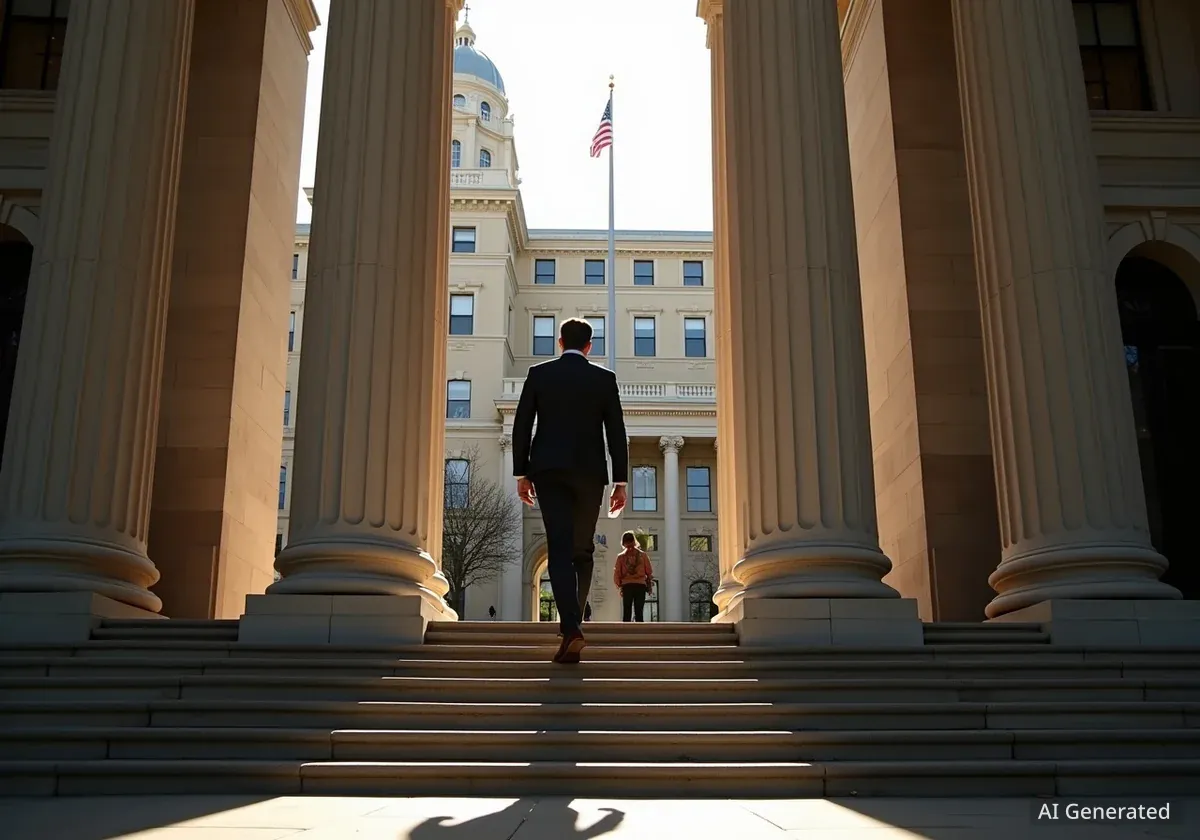A class-action lawsuit has been filed in federal court challenging a new Texas law, known as Senate Bill 17, which restricts citizens from China, Russia, Iran, and North Korea from purchasing or leasing property in the state. The legal challenge, brought by three Chinese citizens, argues the law is unconstitutional and discriminatory.
Key Takeaways
- A new Texas law, SB 17, prohibits citizens and companies from four specific countries from buying or leasing property for more than one year.
- Three Chinese citizens have filed a class-action lawsuit, claiming the law violates the U.S. Constitution and unfairly targets individuals of Chinese descent.
- Proponents, including Governor Greg Abbott, defend the law as a necessary measure for national security to protect critical infrastructure.
- The lawsuit argues that the state law oversteps into federal authority regarding foreign affairs and national security.
Details of the New Texas Law
Senate Bill 17, which officially became law on September 1, imposes significant restrictions on real estate transactions involving individuals and entities from specific foreign nations. The law explicitly names China, Iran, North Korea, and Russia as designated countries.
Under the new regulations, citizens from these nations are barred from purchasing property in Texas. The law also extends to leasing agreements, making it illegal for them to sign a lease for a home or apartment with a term longer than 12 months. This provision directly impacts students, workers, and other temporary residents.
The state has established severe consequences for violations. Any individual from a restricted country who acquires property could face state jail felony charges. Companies found in violation are subject to substantial financial penalties, which could be the greater of $250,000 or 50% of the property's market value.
The Legal Challenge Against SB 17
The lawsuit against the state was filed in the U.S. District Court in Austin, naming Texas Attorney General Ken Paxton as the defendant. The plaintiffs consist of three Chinese citizens who currently reside in Texas and are directly affected by the law's implementation.
Who Are the Plaintiffs?
The legal challenge is led by individuals whose lives are being disrupted by SB 17. One plaintiff is a sophomore at Baylor University, legally present in the U.S. on an F-1 student visa. He currently rents an apartment in Waco but faces housing instability due to the one-year lease limit. The other two plaintiffs are homeowners who, according to the lawsuit, may be forced to sell their properties and divest from the market.
The core of their legal argument is that SB 17 is unconstitutional. The plaintiffs' attorneys contend that the law unfairly discriminates against people based on their national origin, a violation of equal protection principles.
“The law stigmatizes them and their communities, and casts a cloud of suspicion over anyone of Chinese descent who seeks to buy property in Texas,” the lawsuit states, highlighting the perceived discriminatory impact.
Furthermore, the lawsuit claims that Texas is encroaching on powers reserved for the federal government. It argues that regulating foreign investment and its relation to national security is a matter of federal authority, not state legislation.
State's Position on National Security
Texas officials have defended SB 17 as a critical measure to safeguard the state's security interests. Governor Greg Abbott and other proponents argue that the law is designed to prevent hostile foreign governments from gaining influence over Texas land and infrastructure.
In a press release, Governor Abbott stated the rationale clearly. “Hostile foreign adversaries like China, Russia, Iran, and North Korea... must not be allowed to own land in Texas,” he said. “They should not be allowed access to our critical infrastructure, and they may not be allowed to exploit our border.”
The governor emphasized that the law includes strong deterrents. “Stiff, criminal penalties will be inflicted on those who violate these laws,” he added, framing the issue as a straightforward matter of protecting the state from potential threats.
Texas Housing Market at a Glance
In 2023, Texas was a national leader in residential construction, accounting for 15% of all new housing permits issued in the United States. This building boom is a response to rapid population growth fueled by both domestic and international migration. The state's capital, Austin, has recently shifted to a buyer's market due to an oversupply of listings.
Impact on Individuals and the Broader Market
The immediate effects of SB 17 are being felt by foreign nationals living in Texas. The Baylor University student mentioned in the lawsuit now faces a restricted rental market. According to the court filing, while leases under one year are available, they limit his options and likely increase his rental costs, as most landlords prefer longer-term commitments.
For the two homeowner plaintiffs, the law creates a future where they may be unable to maintain their property investments, forcing them to sell their homes. This situation has created a state of legal uncertainty for many international students, professionals, and investors from the affected nations who have made Texas their home.
The law's broader economic implications remain to be seen. Texas has benefited significantly from population growth and investment. The state's real estate market has been dynamic, with builders focusing on smaller, more affordable homes to meet demand. The median square footage of new homes has decreased by 5.3% since 2020, and more properties are being listed under $350,000.
As the lawsuit proceeds through the federal court system, the enforcement of SB 17 continues. For now, the law remains in effect, leaving many individuals in a precarious position while they await a judicial decision on its constitutionality.





